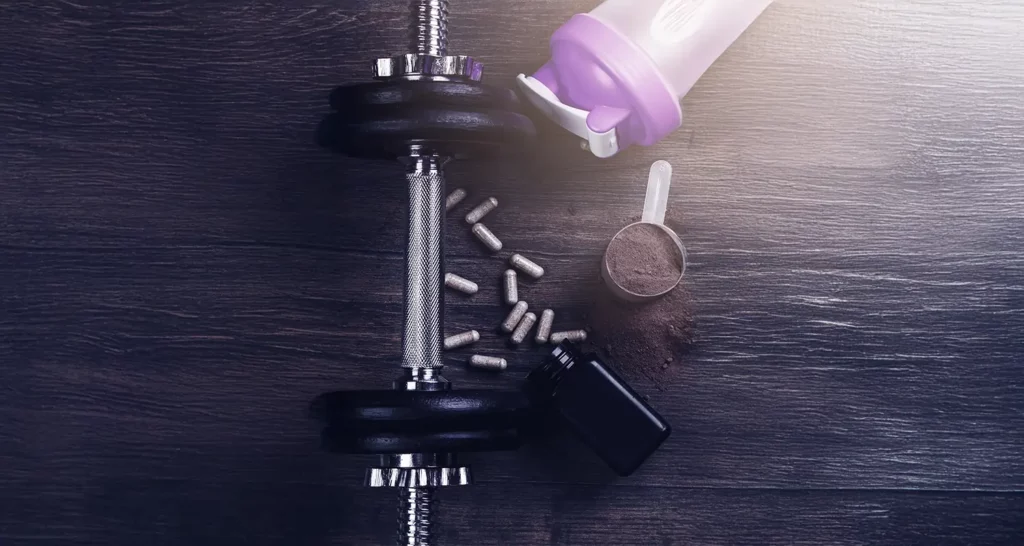
Does Ashwagandha Increase Testosterone?

What Is Ashwagandha?
Ashwagandha is a popular herbal supplement and medicinal herb with a long history. It comes from an evergreen shrub (Withania somnifera) found in India, the Middle East, and parts of Africa, and has been used for thousands of years in Ayurvedic medicine as a general tonic for health.
In Sanskrit, the name “ashwagandha” means “smell of a horse,” hinting at the notion that it can impart the strength and vitality of a horse. Modern wellness circles often call ashwagandha an adaptogen, which means it may help the body adapt to stress and maintain balance.
Research shows that Ashwagandha KSM-66 can increase testosterone levels by up to 17%, supporting muscle growth, energy, and overall vitality.
Think of an adaptogen as a kind of stress shield—helping your body stay resilient when life gets hectic. Because ashwagandha is known for promoting vitality and reducing stress, people naturally wonder about its effects on hormones. Specifically, does ashwagandha increase testosterone?
In this blog, we’ll explore that question and look at what science says about ashwagandha’s impact on testosterone.

Does Ashwagandha Increase Testosterone?
Over the years, ashwagandha has gained a reputation for boosting male vitality. Traditional healers often used it as an aphrodisiac and a remedy to support men’s strength and energy.
This history of ashwagandha benefits for men naturally leads to the idea that it might influence male hormones like testosterone. In recent times, there’s growing interest in natural testosterone boosters and herbal supplements for hormone health. Ashwagandha frequently appears on that list, as many people seeking a natural edge ask, does ashwagandha increase testosterone? The buzz comes from early research and anecdotal reports suggesting that ashwagandha could help balance hormones and improve things like libido, muscle strength, and mood. Before jumping to conclusions, though, it’s important to understand the science behind these claims.

The Role of Testosterone in Men’s Health
Testosterone is often called the “male hormone,” and for good reason. It’s the primary sex hormone in men, responsible for a host of functions that make guys feel, well, manly. During puberty, testosterone helps develop a deeper voice, facial hair, and muscle mass. Throughout adult life, it continues to play a key role in maintaining muscle strength, bone density, red blood cell production, mood stability, and a healthy libido. In simpler terms, testosterone is a big part of what gives men their energy and drive.
However, testosterone levels don’t stay constant forever. They generally peak in early adulthood and then gradually decline with age. Lifestyle factors can also affect these levels. For instance, chronic stress, poor sleep, lack of exercise, or an unhealthy diet can lead to lower-than-optimal testosterone. When testosterone dips too low, men may experience symptoms like:
- Low energy and fatigue: Feeling run-down or less motivated than usual.
- Reduced muscle mass and strength: Difficulty building muscle even with exercise, or noticing muscles shrinking.
- Decreased sex drive and performance: Lower libido, fewer spontaneous erections, or other changes in sexual function.
- Mood changes: Increased irritability, sadness, or trouble concentrating (sometimes nicknamed the “male menopause” when related to hormone changes).
These effects of low testosterone can impact quality of life. That’s why maintaining balanced testosterone levels is important for men’s health and why many men explore supplements and lifestyle changes as natural testosterone boosters. If ashwagandha could help even a little in this department, it’s easy to see why it has people’s attention!
| GET 20% OFF | Use Code:
T-BOOST20
-
Product on sale
 60 Ashwagandha KSM-66 PatchesOriginal price was: £49.99.£24.99Current price is: £24.99.
60 Ashwagandha KSM-66 PatchesOriginal price was: £49.99.£24.99Current price is: £24.99.

Ashwagandha’s History: Traditional Benefits for Men
Long before lab studies and clinical trials, ashwagandha was cherished in traditional medicine for its effects on male vitality. In Ayurvedic texts, it’s described as a rasayana, or rejuvenator, believed to give longevity and strength. Healers used ashwagandha to support sexual health, earning it a reputation as a natural virility booster. The idea was that this herb could restore balance and vigour to someone who was fatigued or feeling “out of steam.” It’s no coincidence that ashwagandha was often given to help with fertility and libido issues in men.
This historical usage laid the groundwork for modern curiosity. Essentially, ancient practitioners observed that men taking ashwagandha seemed to have more energy and better sexual well-being, even if they didn’t know about hormones like we do today. Such observations hinted that ashwagandha might be doing something behind the scenes biologically. Now, with modern science, we can test these age-old claims about ashwagandha’s benefits for men—and particularly, investigate its influence on testosterone.

Modern Interest in Natural Testosterone Boosters
Fast forward to today, and interest in boosting testosterone naturally has skyrocketed. Many men are looking for alternatives to synthetic hormones or just ways to optimise their hormone levels through diet, exercise, and supplements. This has led to the popularity of a variety of herbal supplements for testosterone, from fenugreek and Tribulus terrestris to ginseng and maca. Ashwagandha has emerged as a star in this space, largely because it addresses one of the sneaky culprits behind low testosterone: stress. As a result, the once-fringe question does ashwagandha increase testosterone is now being examined in scientific studies, not just debated in gym locker rooms.
Unlike a flashy bodybuilding supplement that promises instant muscle, ashwagandha works more holistically. It’s not directly a testosterone pill; instead, it’s thought to create a better internal environment for your body to produce its own testosterone. The appeal is that ashwagandha is a natural approach. You’re essentially giving your body a helping hand to balance itself, rather than adding external testosterone. For those who prefer herbal or holistic remedies, this makes ashwagandha particularly attractive among natural testosterone boosters.

Stress and Hormones: Cortisol vs Testosterone
One key factor linking ashwagandha to testosterone is stress. To understand this, we need to talk about cortisol, the so-called “stress hormone.” When you’re under stress (like running late to work, worrying about bills, or pushing hard in training without rest), your body releases cortisol. This is a normal part of the “fight or flight” response. But if cortisol stays high for too long, it can start causing trouble for other hormones—including testosterone.
Ashwagandha KSM-66 has been clinically studied for reducing stress and boosting energy levels without stimulants!
Think of cortisol and testosterone as sitting on opposite ends of a seesaw. When stress is chronically high, cortisol goes up and testosterone often goes down. In fact, research reports that right after a spike in cortisol (from stress), there’s usually a significant drop in testosterone secretion. This makes sense biologically: under stress, your body prioritises survival over reproduction, temporarily dialing down testosterone and other reproductive functions. Over time, if someone is constantly stressed, their hormone balance can get thrown off (stress and hormone balance are deeply connected). Some studies even indicate that severe stress can disrupt the signals from the brain to the testes, resulting in much lower testosterone production.
The bottom line is that chronic stress is bad news for your testosterone levels.
This is where ashwagandha enters the scene: by helping to control stress and cortisol, it might indirectly help keep testosterone at healthier levels. Before we delve into exactly how ashwagandha fights stress, remember that managing stress (through lifestyle or supplements) is a cornerstone of maintaining hormonal health.

How Ashwagandha Helps Reduce Stress
Ashwagandha’s stress-relieving properties are one of its most well-known benefits. As an adaptogen, this herb essentially helps “turn down the volume” on your body’s stress response. Several modern studies have demonstrated that taking ashwagandha can significantly reduce feelings of stress and anxiety (often measured by validated questionnaires). Even more telling, it can reduce cortisol levels in the body.
For example, a systematic review of clinical trials found that ashwagandha supplementation led to notably lower cortisol levels compared to a placebo. In some studies, cortisol (the stress hormone) dropped by around 20-30% after a couple of months of daily ashwagandha use. That’s a substantial calming effect on the body’s biochemistry. Participants taking ashwagandha often report feeling less frazzled and more focused, which isn’t surprising if their stress hormones are better controlled.
By helping to keep cortisol in check, ashwagandha may prevent the stress-induced hormonal imbalance we discussed earlier. It’s like giving your body a chance to take a deep breath and reset, instead of remaining in constant high-alert mode. Many researchers are exploring ashwagandha as a natural aid for stress and hormone balance, which is exactly why it’s being studied in relation to testosterone.

Can Less Stress Mean Higher Testosterone?
Now to connect the dots: if chronic stress lowers testosterone, and ashwagandha reduces stress, can less stress mean higher testosterone? Potentially, yes. By taming cortisol and helping you relax, ashwagandha creates conditions under which your body can produce testosterone more freely again. Think of it this way: if stress is putting your hormonal system in a chokehold, ashwagandha helps loosen the grip.
Research suggests that Ashwagandha may improve memory and cognitive function, making it great for brain health.
It’s important to note that ashwagandha isn’t directly adding testosterone to your system. Instead, it’s removing an obstacle (excess stress) that might be holding your testosterone back. Some experts describe this as “supporting healthy hormone balance.” In practical terms, a man under heavy stress might see his testosterone climb back up closer to normal once he starts managing stress better—ashwagandha is one tool that might help achieve that. It essentially assists your body’s own ability to regulate hormones appropriately.
So, in a roundabout way, by fighting stress, ashwagandha addresses one root cause of hormonal imbalance. In that sense, the answer to “does ashwagandha increase testosterone” could be yes – indirectly, by lifting the weight of stress off your system. Reducing anxiety, improving sleep, and calming the mind all can contribute to a healthier endocrine system. There’s a reason why stress relief often correlates with improved libido and vitality: the hormonal gears are turning smoothly again!

How Ashwagandha Could Boost Testosterone
(Possible Mechanisms)
Scientists are investigating a few different ways ashwagandha might indirectly boost testosterone production. It’s not magic or a direct hormone injection, but ashwagandha could influence the body’s hormone pathways in subtle but meaningful ways. Here are some possible mechanisms by which ashwagandha may support higher testosterone:
- Reducing stress hormones: As we’ve covered, ashwagandha lowers cortisol (the stress hormone). Lower cortisol can relieve the suppression on testosterone production. In simple terms, less stress hormone may allow your testosterone levels to rise naturally back to a healthier state.
- Boosting precursor hormones: Ashwagandha has been linked to increases in hormones like DHEA-S (dehydroepiandrosterone sulfate). DHEA-S is an androgen precursor that the body can convert into testosterone. In one study, men taking ashwagandha saw an 18% rise in DHEA-S along with their testosterone increase, suggesting ashwagandha nudges the whole hormone cascade upward.
- Increasing luteinizing hormone (LH): LH is a hormone from your pituitary gland that signals the testes to produce testosterone. In a clinical trial with infertile men, ashwagandha supplementation led to a significant 34% increase in LH levels. More LH is like a louder knock on the testes’ door, basically telling them “hey, make more testosterone!”
- Antioxidant and tissue support: Ashwagandha is rich in antioxidants, helping to combat oxidative stress in the body. The cells that produce testosterone (Leydig cells in the testes) are sensitive to oxidative damage. By neutralising harmful free radicals, ashwagandha might protect these cells and support healthier hormone production. In fact, a 2018 scientific review suggested that ashwagandha’s fertility benefits are likely due to reduced oxidative stress and improved antioxidant activity in the reproductive system.
- Improved sleep and recovery: Many users report better sleep quality when taking ashwagandha. Good sleep is crucial for testosterone production (most testosterone release in men happens during deep sleep). While this link is more anecdotal, it stands to reason that if ashwagandha helps you sleep better and recover from fatigue, your hormones will thank you.
All these factors combine to show how ashwagandha works as a support system for your endocrine (hormone) health. It’s not about spiking testosterone unnaturally high, but about optimising the environment for your body to produce the testosterone it should.

Does Ashwagandha Increase Testosterone?
With the groundwork laid, let’s address the big question head-on: does ashwagandha increase testosterone according to scientific studies? The overall answer is that it may, especially in certain situations. A growing body of research suggests ashwagandha can lead to modest increases in testosterone levels for many men. However, results can vary depending on factors like the individual’s baseline health, age, and stress levels.
On the whole, most clinical trials on men have found a positive effect. In fact, a comprehensive look at multiple studies concluded that ashwagandha supplementation often supports healthy testosterone levels in men. That said, not every study showed a huge boost; some saw smaller changes or none at all. But it’s telling that the majority tilt towards showing an increase. Typically, the observed boosts in testosterone are in the range of about 10% to 20% above baseline in those who respond.
It’s also important to set expectations: ashwagandha isn’t going to take someone with normal testosterone and turn them into a bodybuilder overnight. But if someone has slightly low testosterone or is under a lot of stress, ashwagandha might help bump those levels up a bit closer to the optimal range.

Ashwagandha Scientific Studies
Ashwagandha in Ageing Men with Low Testosterone
One notable study examined ashwagandha’s effects in ageing, overweight men – a group that often experiences declining testosterone. Published in 2019, this was a randomized, placebo-controlled trial (the gold standard for testing). Men aged 40 to 70 with mild fatigue took either ashwagandha extract or a placebo daily for 8 weeks. The ashwagandha dosage provided 21 mg of withanolides per day (a standardised active component).
What were the results? By the end of the trial, the men taking ashwagandha had about a 14–15% greater increase in testosterone compared to the placebo group. To put that in perspective, if a man’s testosterone was say 400 ng/dL at baseline, a 15% increase would raise it to around 460 ng/dL. This was a statistically significant difference (meaning it likely wasn’t just by chance).
Interestingly, the study also measured another hormone called DHEA-S, which went up by 18% with ashwagandha – further evidence of hormonal benefits. It’s worth noting that the men’s subjective reports of vigour and well-being didn’t differ much between the ashwagandha and placebo groups. In other words, while their hormone levels did improve, they didn’t necessarily feel drastically different in that short timeframe. This tells us two things: first, ashwagandha can indeed increase testosterone in older men; and second, the improvements may be modest and might take more time or a larger study to translate into noticeable changes in daily life. Regardless, this study provided solid evidence that ashwagandha positively influences testosterone in a population where boosting T can have real benefits.

Ashwagandha for Strength and Muscle Gains
Another fascinating study looked at younger men participating in a weight training program. This study, published in 2015, wanted to see if ashwagandha could enhance the effects of resistance exercise. About 57 healthy men (aged 18–50) who were relatively new to weightlifting were split into two groups: one took 300 mg of ashwagandha root extract twice a day (so 600 mg per day total), and the other took a placebo. Both groups followed the same 8-week structured lifting routine.
The results were impressive for the ashwagandha group. Not only did they gain more muscle size and strength than the placebo group, but their testosterone levels also went up significantly more. Specifically, after 8 weeks, the ashwagandha users had a much larger increase in testosterone: on average about +96 ng/dL, versus only +18 ng/dL in the placebo group. In percentage terms, that was roughly a 15% rise for the ashwagandha group, while the placebo group saw a negligible change. This difference in testosterone was statistically significant (p = 0.004, for the statistically curious folks).
In practical terms, the men taking ashwagandha got stronger (their bench press and leg extension lifts improved more than placebo) and also ended up with higher testosterone at the end of the study. This suggests that ashwagandha might be particularly useful for active individuals – it can support training gains and give a hormonal boost. Keep in mind these participants were not deficient in testosterone to start with; the herb still helped push their levels higher alongside exercise. It’s a good reminder that ashwagandha’s benefits aren’t limited to just those with hormone problems – even healthy, exercising men saw improvements.

Ashwagandha’s Effects on Male Fertility
Ashwagandha isn’t just for older men or gym-goers; it’s also been studied in men struggling with fertility issues. In a pilot study focusing on oligospermia (low sperm count), researchers gave men ashwagandha to see if it would improve their reproductive health. These men took a high-concentration ashwagandha root extract (about 675 mg per day, divided into three doses) for 3 months. The results were quite encouraging.
After 90 days of treatment, the ashwagandha group showed significant improvements in multiple areas. First, their sperm count and motility (movement) improved dramatically – sperm concentration went up by over 150% on average! Alongside these fertility gains, their hormones also shifted in a positive direction. Testosterone levels increased by 17% from baseline on average, and the men’s luteinizing hormone (LH) levels rose by 34% (which aligns with the testosterone boost).
For men who had suboptimal testosterone and fertility to begin with, these changes were significant. Essentially, ashwagandha helped “rejuvenate” their reproductive system – better sperm parameters and more hormonal activity. This provides a scientific basis for ashwagandha’s ancient reputation as a remedy for male infertility. It’s worth noting this was a relatively small study, but its findings are supported by others and by traditional usage. For any man dealing with fertility challenges or low testosterone, herbs like ashwagandha could be a gentle supportive therapy (alongside guidance from a medical professional).

Ashwagandha for Low Libido and Sexual Health
Beyond fertility, ashwagandha has been tested for its impact on sexual well-being, particularly in men with low libido or sexual dysfunction. A 2022 study zeroed in on this aspect: it recruited about 50 adult men who reported having lower sexual desire than they’d like. The participants took 300 mg of ashwagandha root extract twice daily (for a total of 600 mg per day) or a placebo, over 8 weeks. Researchers measured changes in the men’s sexual function and hormone levels. The findings were quite positive.
Men who took ashwagandha reported significantly improved sexual desire and satisfaction compared to those on placebo. Essentially, their libido got a noticeable lift. And along with that, their testosterone levels also rose. The increase in testosterone was statistically significant in the ashwagandha group, meaning it wasn’t just a random blip. Meanwhile, the placebo group didn’t see such improvements. Interestingly, prolactin (another hormone related to sexual function) did not change after the intervention, which indicates the effects were specific to testosterone and sexual well-being.
This study is a good reminder that hormones like testosterone are closely tied to how we feel and perform sexually. By supporting hormone levels, ashwagandha helped these men not only biologically (increasing serum testosterone) but also subjectively (enhancing their sexual experience). For men dealing with a flagging libido or performance issues, ashwagandha might offer a natural boost. It’s not a pharmaceutical erectile dysfunction drug by any means, but its holistic benefits—less stress, better mood, and a bit more testosterone—can all converge to improve sexual health.

Ashwagandha Benefits for Men Beyond Testosterone
By now, it’s clear that ashwagandha can have a positive effect on testosterone and related aspects of men’s health. But the perks of this herb go beyond just hormone numbers. Ashwagandha tends to improve overall well-being in ways that many men will appreciate, especially as some benefits intertwine with healthy testosterone function. Here are some key benefits of ashwagandha for men beyond the direct T boost:
- Stress reduction and mood support: Perhaps the most immediate effect. Many men feel less anxious and more focused when taking ashwagandha. Lower stress can mean better sleep and a happier mood – factors that indirectly help everything from workouts to relationships.
- Improved fertility: As we saw, ashwagandha can significantly improve sperm count and motility. For men trying to start a family or worried about reproductive health, this is a major plus. It naturally tunes up the reproductive system, which often goes hand-in-hand with balanced testosterone.
- Better physical performance: Ashwagandha has been shown to enhance muscle strength and exercise recovery. Men taking it during strength training gained more muscle and even lost more fat than those on placebo. Even outside of the gym, some guys report higher energy levels and endurance in daily activities.
- Sexual well-being: Beyond lab numbers, ashwagandha often improves aspects of sexual health. Men have reported better libido, improved erection quality, or overall sexual satisfaction when using the herb, likely thanks to reduced stress and modest hormone enhancements.
What’s great is that these benefits tend to complement each other. For instance, reducing anxiety can boost libido; gaining strength can elevate mood; improving sleep can enhance hormone regulation. Ashwagandha works on multiple fronts to support men’s health holistically. Even if the testosterone increase it provides is moderate, the combined uplift in mental and physical wellness can be quite impactful. This multi-faceted support is why ashwagandha has earned a reputation as a go-to men’s supplement in the wellness world.

Using Ashwagandha Safely: Dosage and Tips
If you’re considering trying ashwagandha to support testosterone or general health, it’s important to use it correctly. Here are some practical tips on dosage and usage, keeping safety in mind:
- Common dosages: Most research studies have used ashwagandha root extract in the range of 300–600 mg per day. A typical approach is 300 mg twice daily (total 600 mg) of a high-quality extract, as was used in several successful trials. Some supplements provide a single 500 mg capsule daily. Traditional usage of raw ashwagandha root powder can be higher (even 3–5 grams a day), but extracts are concentrated so you don’t need as much.
- Look for standardised extracts: When choosing a supplement, check if it’s standardised to a certain percentage of withanolides (the active compounds). For example, KSM-66 and Sensoril are popular ashwagandha extracts known for consistency. Using a standardized product ensures you’re getting a potent dose of the herb each time.
- Consistency is key: Ashwagandha is not a “take it once and feel it” kind of supplement. It generally needs to build up over a few weeks. In studies, benefits often appeared after 8 or more weeks of daily use. So, aim for daily supplementation and be patient.
- Timing: You can take ashwagandha at a time that suits you. Many people take it in the morning with breakfast or at night before bed. If it makes you a bit sleepy, nighttime might be better. Taking it with food can help prevent any stomach upset.
- Stacking with lifestyle: Remember that ashwagandha works best in combination with a healthy lifestyle. Good nutrition, regular exercise, and adequate sleep will amplify its positive effects. Think of ashwagandha as one piece of the puzzle in your overall hormone and wellness strategy.
Always read the label instructions of the specific product you have, since formulations can vary. Starting with a moderate dose (like 300 mg per day) and seeing how you feel is a reasonable strategy. And as always, if you have any medical conditions or take other medications, it’s wise to discuss with a healthcare provider before adding a new supplement.

Ashwagandha Side Effects and Precautions
Ashwagandha is generally considered safe for most people, but as with any supplement, it’s important to be aware of potential side effects and take precautions. The good news is that in research studies, ashwagandha has shown a strong safety profile with minimal adverse effects. Here are some key points on safety:
- Common mild side effects: Some people report slight drowsiness, stomach upset, or diarrhea when taking ashwagandha. These side effects are usually mild and often go away as your body adjusts. Taking ashwagandha with food can minimise stomach issues.
- Rare reactions: It’s uncommon, but there have been a few reports of more serious effects like liver issues in isolated cases of very high-dose use or unusual reactions. These are extremely rare, but they remind us that “natural” doesn’t always mean “zero risk.” Pay attention to how you feel, and if you notice any yellowing of the skin (jaundice) or extreme fatigue while on ashwagandha, stop use and consult a doctor.
- Pregnancy and medical conditions: Pregnant women are generally advised not to take ashwagandha, because it may stimulate uterine contractions (increasing the risk of miscarriage). If you have autoimmune conditions (like lupus or Hashimoto’s thyroiditis) or are on medications (for example, sedatives, thyroid medication, or blood sugar drugs), check with your healthcare provider. Ashwagandha can interact with certain medications or conditions due to its effects on the immune system and thyroid hormone levels.
- Quality of supplement: Ensure you buy from reputable brands like Stronglife. Contamination or mislabeling can pose risks. A quality product will contain what it says it does (pure ashwagandha) without harmful additives.
In summary, ashwagandha has a low-risk profile for most people. Many individuals take it daily with no issues. Just use common sense: start with a moderate dose, listen to your body, and consult a professional if you have specific health concerns. That way, you can reap the benefits of this herb with peace of mind.

Ashwagandha vs Other Herbal Supplements for Testosterone
Ashwagandha is just one piece of the puzzle when it comes to herbal approaches for testosterone support. How does it compare to other herbal supplements for testosterone out there? Below is a brief comparison of ashwagandha with a few popular options:
| Herbal Supplement | Evidence for Testosterone Boost | Notes |
|---|---|---|
| Ashwagandha (Withania somnifera) | Multiple human studies show a moderate increase (often ~10–15%) in testosterone levels, especially in stressed or infertile men. | Also lowers cortisol (stress hormone) which indirectly benefits hormone balance. Offers well-rounded benefits (strength, fertility, mood) beyond just testosterone. |
| Tribulus Terrestris | Despite its popularity, most research finds no significant rise in testosterone from tribulus in humans. | May improve libido, but not T levels substantially. Often included in “testosterone booster” blends, but evidence is weak for raising T. |
| Fenugreek | Some studies indicate a slight increase in total or free testosterone, while others show more of a libido boost than a clear T boost. | Contains compounds that may reduce the conversion of testosterone to DHT or oestrogen, potentially leaving more free testosterone. Results vary by individual. |
| Tongkat Ali (Eurycoma longifolia) | Emerging evidence suggests tongkat ali (“Longjack”) can raise testosterone, particularly in men with low baseline levels. | Traditionally used in Southeast Asia as an aphrodisiac. Some studies show improved T and sperm quality, but more research is needed for consensus. |
| Maca (Lepidium meyenii) | Does not significantly increase testosterone, according to research, despite being marketed for male vitality. | Improves libido and energy, which can be beneficial, but its effects seem independent of testosterone (it may work via other pathways). |
As you can see, each herb has its own profile. Ashwagandha stands out for its stress-reducing action and the relatively solid evidence backing its testosterone benefits. Tribulus and maca are great for libido but won’t do much for actual T levels. Fenugreek and tongkat ali show some promise for testosterone, but not as broadly or consistently as ashwagandha so far. Keep in mind that supplements can work differently for each individual – and sometimes they might even be combined for a synergistic effect. It’s always wise to research an herb’s background (and ideally consult a health professional) before expecting it to boost your testosterone.

What Results Can You Expect (Keeping It Real)
After exploring all this research, you might be wondering what you personally can expect from ashwagandha. It’s time for a reality check. From the research above, it appears the answer to “does ashwagandha increase testosterone” is yes in many cases — however, the effect is typically moderate – think of it as giving you a helpful nudge, not a giant leap. If your testosterone is low due to chronic stress or fatigue, ashwagandha could bring it up by that 10–15% we frequently see in studies. This could be enough to go from just-below-normal to comfortably normal, which might translate into noticeable improvements in energy, mood, or libido.
However, if you are a healthy individual with already normal testosterone levels, you might not feel a dramatic difference. Ashwagandha isn’t like taking anabolic steroids or testosterone replacement therapy – it won’t push you beyond your natural physiological range. Instead, it may help ensure you’re at your own peak level. Many users describe the effects of ashwagandha as subtle but positive: sleeping better, handling stress easier, perhaps recovering faster from workouts, and then seeing secondary benefits like steadier energy and a slightly higher sex drive.
One key thing to remember is individual variability. Genetics, lifestyle, and baseline hormone levels all influence how much ashwagandha will help. Some men might see a clear uptick in their morning pep and performance after a month or two on ashwagandha; others might shrug and say it’s not very noticeable. It’s not a one-size-fits-all miracle pill, but it is a science-backed tool that, when combined with healthy habits, can tilt the scales in your favour.
So, in keeping it real: yes, ashwagandha may increase testosterone for you, but likely by a margin that complements other good practices (like exercise, diet, and stress management). Think of it as a steady ally for your health, rather than a quick fix. Manage your expectations, and you’re more likely to be pleasantly surprised by the overall improvements in how you feel.

The Bottom Line: Does Ashwagandha Increase Testosterone?
So, does ashwagandha increase testosterone? In summary, it can – particularly in men who stand to benefit the most (those under stress, with slightly low levels, or seeking an extra edge). Ashwagandha is not a magic hormone booster, but the evidence shows it often nudges testosterone upward while improving other facets of health. By reducing stress and possibly enhancing the body’s own hormone signaling, this herb creates a more favourable environment for testosterone production.
The boost you get might be modest (think in the tens of percent, not multiples), but that can be enough to make a difference in how you feel day-to-day. Moreover, ashwagandha’s complementary benefits – less anxiety, better sleep, improved strength and vitality – amplify the positive impact. You’re not just chasing a number on a lab test; you’re supporting your overall well-being. That holistic improvement is where ashwagandha truly shines as a natural testosterone booster.
In a world full of exaggerated supplement claims, ashwagandha stands out as a remedy with both ancient roots and modern scientific backing. It may not turn you into a superhero overnight, but it could help you feel a bit more like the best version of yourself over time. And ultimately, that’s the goal of our health supplements: to support you in living a stronger, healthier life. Ashwagandha, with its friendly yet powerful effects, fits that bill quite nicely.
Does Ashwagandha Increase Testosterone?
Frequently Asked Questions:
Does ashwagandha actually raise testosterone?
Ashwagandha may help increase testosterone levels, particularly in men experiencing stress or infertility. Studies have shown that this adaptogenic herb can reduce cortisol (the stress hormone), which may indirectly support healthy testosterone production. Some research indicates that supplementing with ashwagandha can lead to a moderate increase in testosterone levels, especially in physically active men or those with hormonal imbalances. However, its effects are not as strong as pharmaceutical testosterone boosters, and results can vary depending on individual health factors.
Does ashwagandha increase PP size?
There is no scientific evidence to support the claim that ashwagandha increases penis size. While ashwagandha may help improve blood circulation and reduce stress, which can enhance overall sexual performance and libido, it does not physically alter penis size. Many herbal supplements are marketed with exaggerated claims, so it’s essential to rely on evidence-based research rather than myths or anecdotal reports.
Does ashwagandha build muscle?
Ashwagandha may support muscle growth and strength, particularly when combined with resistance training. Research suggests that it can enhance muscle recovery, reduce exercise-induced stress, and increase testosterone levels, which are all beneficial for muscle development. A few studies have found that men taking ashwagandha supplements experienced greater gains in muscle size and strength compared to those who did not. However, while ashwagandha can be a helpful supplement, it should be combined with proper diet and exercise for optimal muscle-building results.
What does ashwagandha do for a man?
Ashwagandha offers several potential benefits for men, including improved stress management, enhanced testosterone levels, better muscle recovery, and increased energy levels. It is also known to support reproductive health by improving sperm quality and motility. Additionally, ashwagandha may aid in reducing anxiety and promoting better sleep, which can indirectly support overall health and well-being. While these benefits are promising, individual results may vary based on lifestyle and health conditions.
How to get 1000 testosterone levels?
Achieving testosterone levels of 1000 ng/dL naturally requires a combination of proper nutrition, strength training, quality sleep, and stress reduction. Consuming a diet rich in healthy fats, lean proteins, and micronutrients like zinc and vitamin D can support testosterone production. High-intensity workouts, especially compound weightlifting exercises, have been shown to boost testosterone levels. Managing stress through meditation, proper sleep, and adaptogens like ashwagandha can also help maintain optimal hormonal balance. If testosterone levels remain low despite lifestyle changes, medical evaluation may be necessary.
Does ashwagandha work like steroids?
No, ashwagandha does not work like anabolic steroids. While it may support testosterone production and muscle growth, its effects are much milder compared to synthetic steroids. Steroids artificially increase testosterone levels, leading to rapid muscle gain and potential side effects, whereas ashwagandha helps regulate stress, improve recovery, and promote natural hormonal balance. It is a natural supplement that supports the body’s normal functions rather than forcefully altering them like steroids.
What are the downsides of ashwagandha?
While ashwagandha is generally safe for most people, some potential downsides include digestive issues, drowsiness, and interactions with certain medications. In rare cases, excessive doses may cause nausea, diarrhoea, or an upset stomach. Ashwagandha can also lower blood pressure and blood sugar levels, so individuals with hypotension or diabetes should consult a doctor before using it. Additionally, pregnant and breastfeeding women should avoid ashwagandha due to a lack of research on its safety during these periods.
Is ashwagandha better than creatine?
Ashwagandha and creatine serve different purposes, making it difficult to compare them directly. Ashwagandha is an adaptogen that helps reduce stress, support hormonal balance, and enhance recovery, while creatine is a performance-enhancing supplement that boosts ATP production, leading to increased strength and power output. If muscle gain and performance enhancement are the goals, creatine is more effective. However, if stress reduction, hormonal balance, and overall well-being are priorities, ashwagandha may be more beneficial. Some individuals choose to take both for complementary effects.
What is the most powerful herb for muscle growth?
Ashwagandha is considered one of the most effective herbs for muscle growth due to its ability to reduce cortisol, enhance testosterone levels, and improve recovery. Other powerful herbs that may support muscle growth include fenugreek, tribulus terrestris, and tongkat ali, which are often used to boost testosterone and physical performance. However, while these herbs can provide support, proper nutrition and training are the most critical factors in muscle development.
Does ashwagandha affect getting hard?
Ashwagandha may support erectile function by reducing stress, improving blood flow, and enhancing testosterone levels. Since stress and anxiety are common causes of erectile dysfunction, ashwagandha’s adaptogenic properties can help improve sexual performance. However, it is not a direct treatment for erectile dysfunction, and those experiencing persistent issues should consult a healthcare professional for proper diagnosis and treatment options.
Does ashwagandha show up on a drug test?
No, ashwagandha does not show up on standard drug tests, as it is a natural herbal supplement with no banned or controlled substances. However, if the supplement contains additional ingredients or contaminants, there is a small chance of unexpected test results. It’s always best to purchase ashwagandha from reputable sources to ensure purity and quality.
Can you drink alcohol with ashwagandha?
While there are no known severe interactions between ashwagandha and alcohol, it is generally not recommended to mix them. Ashwagandha has a calming and sedative effect, which, when combined with alcohol, may enhance drowsiness or impair cognitive function. Additionally, since both substances can affect liver enzymes, excessive alcohol consumption alongside ashwagandha may increase the risk of liver stress. Moderation is key, and if you experience any adverse effects, it’s best to avoid mixing the two.









